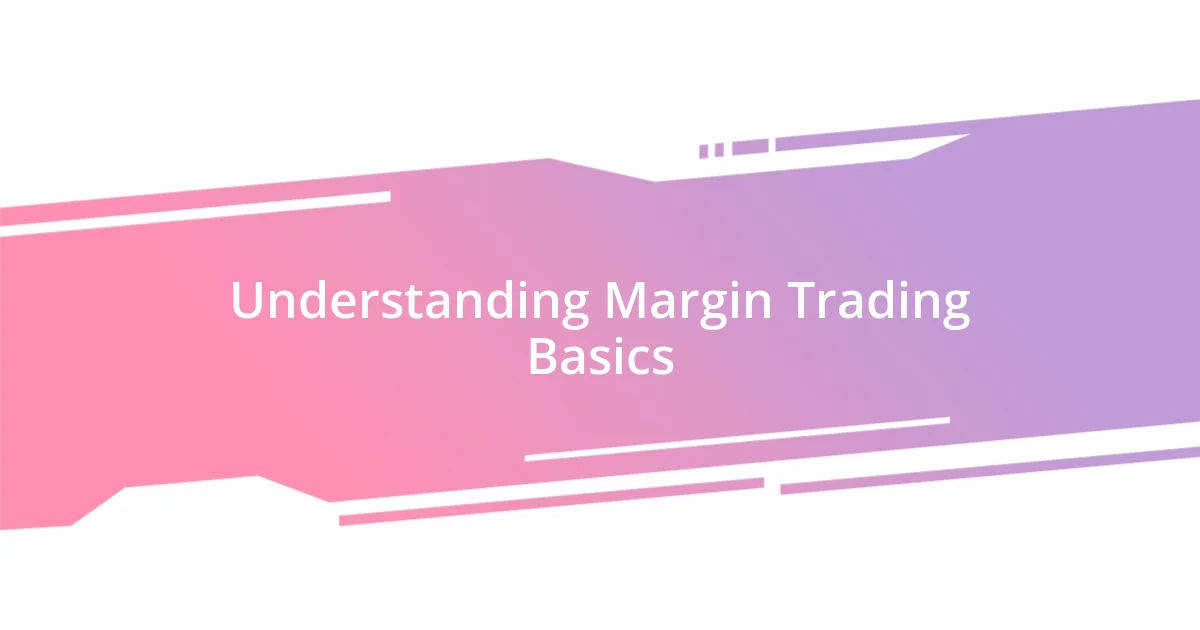Key takeaways:
- Margin trading amplifies both potential gains and losses, necessitating a clear understanding of risks and the importance of margin calls.
- Psychological challenges, including FOMO, overconfidence, and panic during losses, significantly influence trading decisions and outcomes.
- Learning from mistakes, maintaining discipline, and continuous self-reflection are crucial for growth and strategy improvement in margin trading.

Understanding Margin Trading Basics
Margin trading is essentially borrowing funds to increase your buying power. I remember the first time I dabbled in it; the thrill of leveraging my position was intoxicating. But, with that excitement came the weight of responsibility—because if the market turned against me, the impact could be devastating.
To put it simply, margin trading allows you to control a larger amount of an asset than you could with just your capital. Have you ever considered how easy it is to get caught up in the rush of potential gains? I experienced that rush firsthand, but I learned the hard way that the flipside—losses—can amplify just as quickly. It’s vital to understand the risks before diving in; after all, trading on margin isn’t just about potential profits—it’s a balancing act between opportunity and risk.
Understanding margin calls is crucial in this realm. I can still recall the panic I felt when my broker alerted me that my account was about to dip below the required margin. It’s a moment that brings clarity to the serious side of margin trading. You see, staying informed and knowing when to cut losses are key components that can safeguard your investments. Have you thought about how you’d react if a margin call hit you out of nowhere? It’s definitely something to ponder before making that leap.

Psychological Aspects of Margin Trading
Margin trading isn’t just a numbers game; it’s a psychological rollercoaster that tests your emotions and decision-making skills. I remember a time when I was riding high on a successful trade, convinced I was a market genius. That confidence blinded me; I ignored the creeping anxiety about potential losses. What I learned is that a major part of succeeding in margin trading is managing not just your finances but your mindset.
Here are some psychological challenges I’ve encountered:
-
Fear of Missing Out (FOMO): The constant fear that you might miss a potential profit can lead to impulsive decisions. I found myself jumping into trades without proper analysis, chasing after quick gains.
-
Overconfidence: After a series of wins, my ego inflated, leading me to take unnecessary risks. There’s a fine line between confidence and recklessness.
-
Panic during Losses: Experiencing rapid declines in value triggered panic in me, causing me to sell at a loss rather than holding on for recovery. This emotional reaction taught me the value of sticking to a trading plan.
-
Stress Management: The weight of margin trading can be overwhelming, propelling stress levels that affect your personal life. I had to learn to compartmentalize my trading experiences to maintain a balanced perspective.

Learning from Margin Trading Mistakes
Learning from my mistakes in margin trading has been a real eye-opener. One particularly tough lesson involved a moment when I ignored my stop-loss orders, convinced that the market would turn in my favor. When it didn’t, the resulting losses felt like a punch to the gut. It’s a valuable reminder that discipline in trading is essential; deviating from my plan can lead to significant regret.
Another tough day stands out in my memory—the times I let panic dictate my decisions. I vividly recall watching my stocks plummet while my heart raced. Instead of sticking to my strategy, I sold everything, only to see the market bounce back hours later. Did I learn the hard way? Absolutely! It taught me that sometimes the best action is inaction; standing firm amid chaos can yield better outcomes.
Reflecting on my experiences, I’ve realized the importance of continuous learning. Adapting my strategy based on previous missteps has been instrumental in evolving my trading approach. I often ask myself, “What can I do differently next time?” Recognizing my patterns and establishing a routine for reflection has been incredibly helpful. Learning from mistakes isn’t just about the numbers; it’s about growing as a trader and a person.














